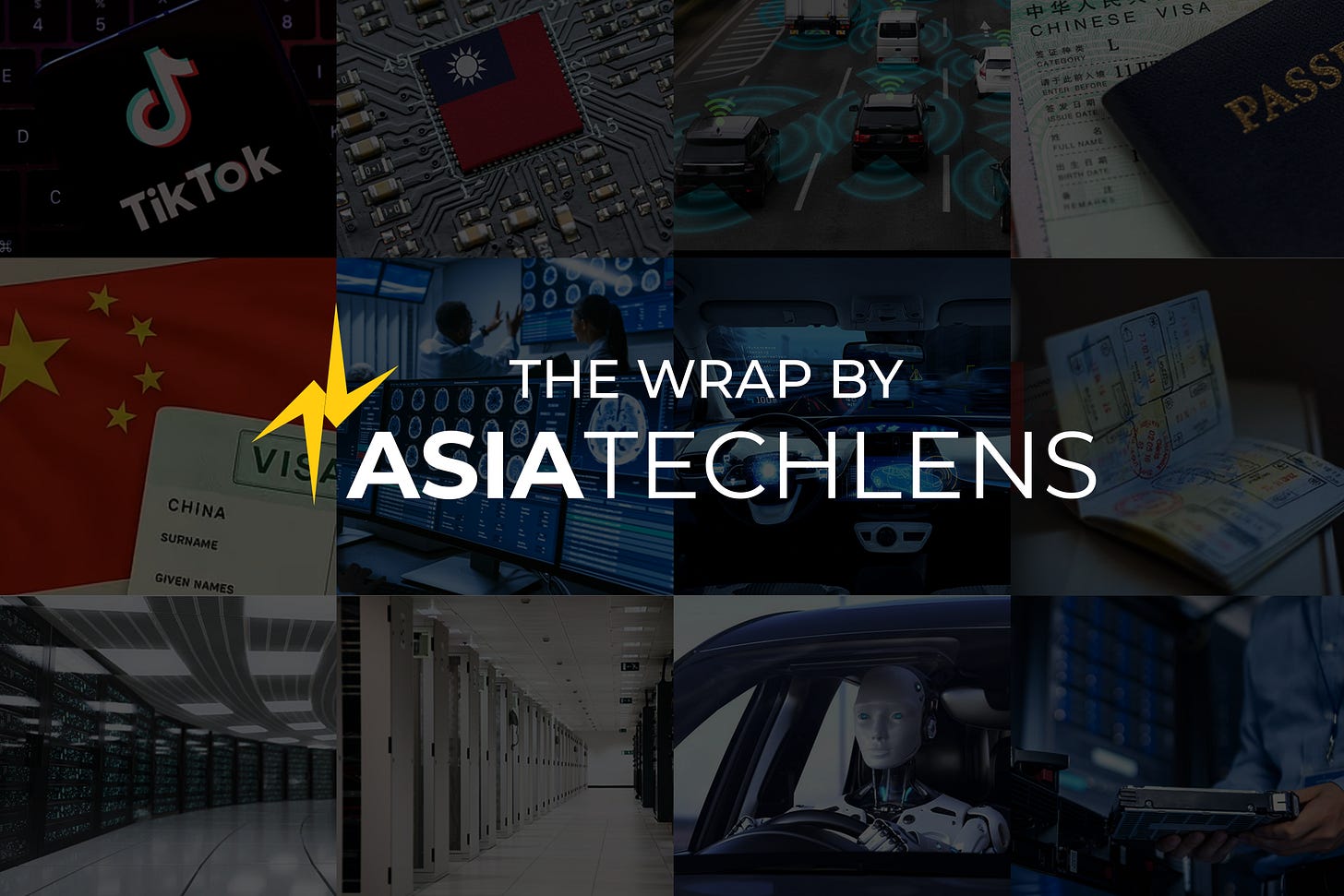The Wrap | 20 – 26 Sept 2025
Asia Tech Lens’ weekly digest: news, context, and signals shaping Asia’s tech future
Editor’s Note: Welcome back to The Wrap by Asia Tech Lens, our weekly digest of the signals, shifts, and stories shaping Asia’s tech future.
Each Friday, we highlight the week’s most important developments, with the context and bottom lines that matter. Whether it’s chips, AI, mobility, or education, our goal is to connect the dots across Asia’s fast-changing tech landscape.
We’d love to hear your feedback as we refine this series; reply directly or drop us a note on LinkedIn.
Social Media | China
Trump Signs Executive Order to Keep TikTok Alive in the US
President Donald Trump has signed an executive order approving a proposal that would keep TikTok operating in the US. ByteDance’s stake would shrink below 20%, while Oracle, Silver Lake, and other backers would oversee TikTok’s US operations and take control of the algorithm. The deal values TikTok’s US business at about $14 billion and extends the divest-or-ban deadline to January. The transaction still requires approval from Beijing.
Bottom Line: The order keeps TikTok alive in its biggest overseas market, but forces ByteDance to surrender control.
AI | China
Alibaba Surges on Plans to Boost AI Spending
Alibaba shares hit a near four-year high after CEO Eddie Wu said that the company will increase AI investment beyond its original $53 billion plan. Wu anticipates that overall investment in AI will accelerate to $4 trillion worldwide over the next five years, and added that Alibaba needs to keep up. The company’s cloud arm, already spanning the U.S. to Australia, will expand further with new data centers in Brazil, France, and the Netherlands next year.
Bottom Line: Alibaba is betting big on AI and cloud expansion abroad, signaling it wants a front-row seat in the global race against U.S. tech giants.
Digital Infrastructure | Japan
SoftBank, Meta Bet on Bandwidth Boom With Japan–Singapore Cable
SoftBank is partnering with social media giant Meta, Telekom Malaysia, Japan’s IPS, and Indonesia’s XLSmart for a new subsea cable called ‘Candle’. The 8,000km (4,970 miles), 24-fiber pair system will connect Japan, Taiwan, the Philippines, Indonesia, Malaysia, and Singapore. Scheduled to begin operations in 2028, the cable system will contribute to infrastructure expansion and secure redundant routes to meet the increasing demand for data communications driven by 5G and generative AI.
Bottom Line: Asia’s data backbone is being strengthened for the AI era, Candle will add capacity and resilience along one of the region’s busiest corridors
Digital Infrastructure | Uzbekistan
Uzbekistan Taps Saudi DataVolt for $6.5B Data Center Push
At the International Conference on Information and Communication Technologies (ICT Week Uzbekistan 2025), Saudi firm DataVolt was appointed to build national data centers, with investment up to $6.5 billion. The facilities are intended to provide sovereign cloud services, giving local IT companies capacity to develop AI and digital products without relying on foreign servers.
Bottom Line: By anchoring data at home, Uzbekistan aims to strengthen digital sovereignty and position itself as a Central Asian hub for AI and cloud innovation.
Talent & Policy | China
China’s New K Visa Targets Global Tech Talent
China is moving aggressively to attract global talent with a new K visa that takes effect October 1, its first major visa reform in over a decade. Aimed at young professionals in science, technology, engineering, and mathematics, the visa allows foreign graduates to enter, study, and work in China without first securing a job offer, research placement, or local sponsor.
Bottom Line: Beijing is opening doors to young STEM talent just as Washington slams them shut, hoping to draw professionals priced out of the U.S. system.
Mobility | Singapore
WeRide and Grab Put Driverless Shuttles on Singapore’s Roads
WeRide and Grab have announced the deployment of 11 autonomous vehicles in Singapore’s Punggol district under the new service Ai.R (Autonomously Intelligent Ride). The fleet includes five-seater GXRs and eight-seater Robobuses, both of which passed Singapore’s Milestone 1 safety test for public road use. The vehicles will undergo a route familiarization phase with trained Grab safety operators on board. Passenger services are expected to begin by next year.
Bottom Line: The launch highlights Singapore as a key test bed for Chinese AV technology.
Semiconductors | Taiwan
TSMC Bets on AI to Solve AI’s Energy Problem
AI processors can consume as much as 1,200 watts per server, roughly the power used by 1,000 US homes if run continuously. With data centres multiplying to meet AI demand, cutting that energy draw has become urgent.
Taiwan Semiconductor Manufacturing Co. (TSMC) is tackling the problem by turning to AI-driven chip design and packaging smaller “chiplets” together for efficiency. The company says the approach could deliver up to tenfold power savings. By partnering with Cadence and Synopsys, TSMC is also automating design tasks that once took engineers days, now completed in minutes.
Bottom Line: Facing AI’s runaway energy appetite, TSMC is using AI itself to design the next generation of more efficient chips.
Signals to Watch
Will Beijing approve Trump’s plan?
Can Alibaba’s expanded AI spend narrow the gap with US rivals?
Can Beijing turn visa reform into a sustained pipeline of global tech workers?
Will AI-driven chip design deliver the tenfold efficiency gains TSMC projects?
For More Info on Asia Tech Lens


